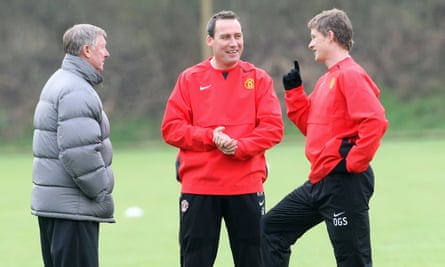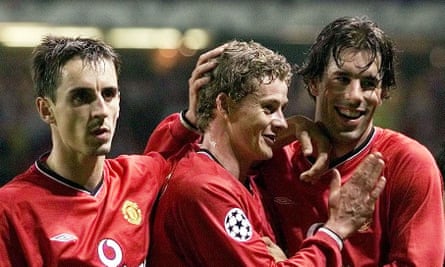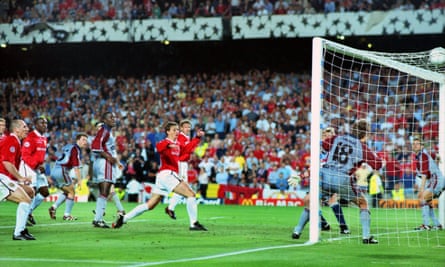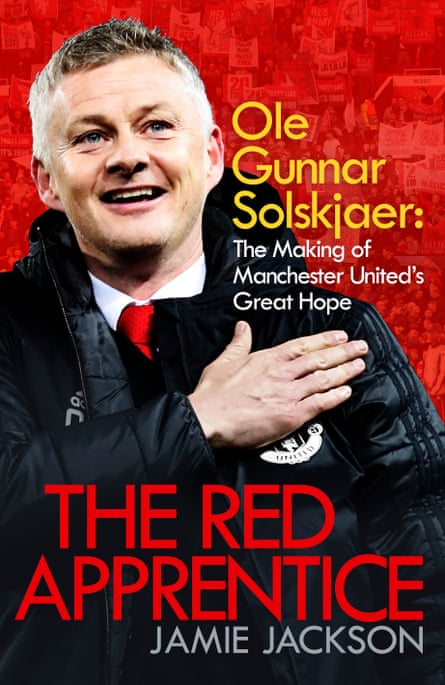See the three figures out on the green grass of Manchester United’s Carrington training base. Working in the hot June sun. Two are together, one stands apart. The two are practising finishing – the other encouraging, coaching, feeding them endless balls to try to score with. They are relentless in their quest to become better. They are Ole Gunnar Solskjær and Ruud van Nistelrooy. They are being schooled by René Meulensteen, a Dutch skills coach who will one day manage Manchester United reserves and have Ole as his assistant. Then one day René will be part of Sir Alex Ferguson’s inner circle, becoming first-team coach. For now, he is drilling Ole and his countryman Van Nistelrooy ahead of their coming internationals.

Ole is a natural finisher. Scoring goals is the most difficult part of football, so says the common wisdom, but he finds it oh-so-simple. Ruud van Nistelrooy is the same. They are each born to score but still they hone their skill and talent, relentless in the quest for perfection. This is a moment in time, this practice on the fields of Carrington. One day all this will be over – the playing – and one day Ole will be in charge of Manchester United. But, here, during this summer week in June, Ole works and works and works.
“Ole, overall, was tactically very astute,” says René, now assistant coach of Australia, having previously managed Anzhi Makhachkala, Fulham, Maccabi Haifa and Kerala Blasters. “He was the kind of player that would change the game even if he came off the bench because he would read the game, he would read what opponents were doing to see what his best movements would be when he would come on, to make a difference. 100% the way he was has showed the manager he has become.
“When I did the reserves in 2005‑06, Ole had been out of surgery for a few weeks and, when he came back, he came back through the reserves, training with us, playing with us before going back to the first team. That’s how I had a lot of contact with him. And he showed even more of an investment with regards to the whole picture of the team, in terms of asking: ‘How did we want to play? How did we defend? Did we press high, how do we do that? If we played on a block, where would we drop into, what were the areas to hit? How?’
“We had a good bunch of players in the reserves. We had Jonny Evans, Gerard Piqué as the centre-backs, we had Giuseppe Rossi up front, Fraizer Campbell on the right‑hand side, Lee Martin on the left. It was a good team; we played some cracking football at times.”
René admires Solskjær’s work ethic – the drive to become better: this is the leitmotif of his playing and coaching career, a mantra when he comes to manage Manchester United, insisting that every one of his footballers must be intent each day on improvement. Meulensteen recalls how OGS went about his own betterment, keen to enhance his areas of talent.
“I think Ole’s biggest attribute as a footballer was his clinical finishing and the range of finishing that he had with both feet. He was such a clean, clean striker of the ball, with both feet, left and right. It was not only the accuracy he could hit the ball with, but the pace. I did so many finishing sessions with him and Ruud van Nistelrooy. Ole sometimes also worked with Diego Forlán as well,” René says of the Uruguayan striker, who was at the club from January 2002 to August 2004.

“I can still remember that particular week in June because they were ticking over before the internationals kicked in – Ole and Ruud – and that’s why we ended up by doing these training sessions. It was focused on finishing in and around the box – in and outside. About creating better shooting opportunities as well because, Ole’s goals, if you analyse them, I think he scored 126 with United, most of them were two-touch, one-touch.
“To be able to do that, you need to have two things. One, you need to have the tactical awareness to be in the right place at the right time, and he has a really good eye for that. His tactical understanding about reading an opponent’s movements and where to be when the attack came into the final stage, that was very good. Secondly, as soon as those chances fell for him, he was very clinical in his finishing, as I said.”
Ole has kept diaries since he was a kid and René encouraged him to take notes of sessions. “Ole is a very strong, opinionated man. He also had a very strong desire to learn,” says René. “He always wanted to know. He always wrote things down. He wrote plenty of our sessions down. That’s what I had advised: ‘If you write things down, you store it on your internal hard drive. If you don’t write things down, believe me, you forget it.’ It’s true because I’ve lived by that rule myself. I’ve logged every bloody training session I’ve done in my career, every time. I go back to my folders and look at them to see: ‘How was that? How did that go?’”
On learning from Ferguson, Ole told FourFourTwo: “From 2000 onwards, I started to make notes of the sessions that we did. I’ve got all the diaries with me. I realised I was experiencing something only my teammates could experience, because he’s unique. Less was more for him. He never talked for hours but whatever he said made a difference.”
This is the importance of the Manchester United school to Ole Gunnar Solskjær. And the willingness to be open to ideas, being humble enough to want to learn, shows a self-awareness that marks out a sophisticated intelligence. Understanding what education could offer, whether as a fit player honing his skills or when in the midst of injury, OGS had, subconsciously or not, a long-term vision, a comprehension of the need, the future usefulness of soaking up any and all nuggets of information.

René believes this can be the difference in footballers. “It’s just so important – it’s the same with young players,” he says. “Young players should write things down, what they’re told in terms of roles and responsibilities. A lot of players don’t. Coaches get over so much information to them, yet players can tend to go through on autopilot, just go with the flow. They do what is asked of them, but it’s more about awareness and understanding, and the job of the coach can be to make that link for them, make players aware of this so they can understand.”
Ferguson noted how Ole watched a match intently from the bench to ensure he could make an impact if called upon. He was the same when preparing for games in training with the first-team squad. It was the same in that hot week in June at Carrington. It was about priming himself. Which Solskjær the manager will install in his own Manchester United squad.
René says: “That process of awareness is a process that takes place on the training pitch and on the field, but more than anything, players need to take ownership. They can only do that by going away and thinking about it. I said the same thing to Cristiano Ronaldo when working with him. ‘There is evidence that the people who have clear aims and targets are many times more successful in what they want to achieve than people who don’t.’”

Raimond van der Gouw, the reserve goalkeeper who watched the Champions League final of 1999 from the bench alongside Ole, recalls him displaying a similar instinct. “He knows what he wants, he had a plan as a player – when he was on the bench, he was always looking at the game, analysing the game. He knew the weakest part of the opponent; at that time he was already the type of player who was tactical. This was more a plan for himself, he knew what he wanted to do. He knew which is the best way to score. We played together for six years and when he was getting older, I found out that he was already looking forward from the football.
“He’s a manager now. Well, when playing he was playing the computer game Football Manager. So when I heard he became a manager in Norway and then he became manager of Manchester United I thought: ‘Yeah – I can see now the little steps he made, from a low step to a high step – in his way he is calculating the next move and is very good at that.’”
The Red Apprentice by Jamie Jackson is published by Simon & Schuster, £20. It is available from the Guardian Bookshop for £17.40
from Football | The Guardian https://ift.tt/2Tv6Lw4
via IFTTT

No Comment